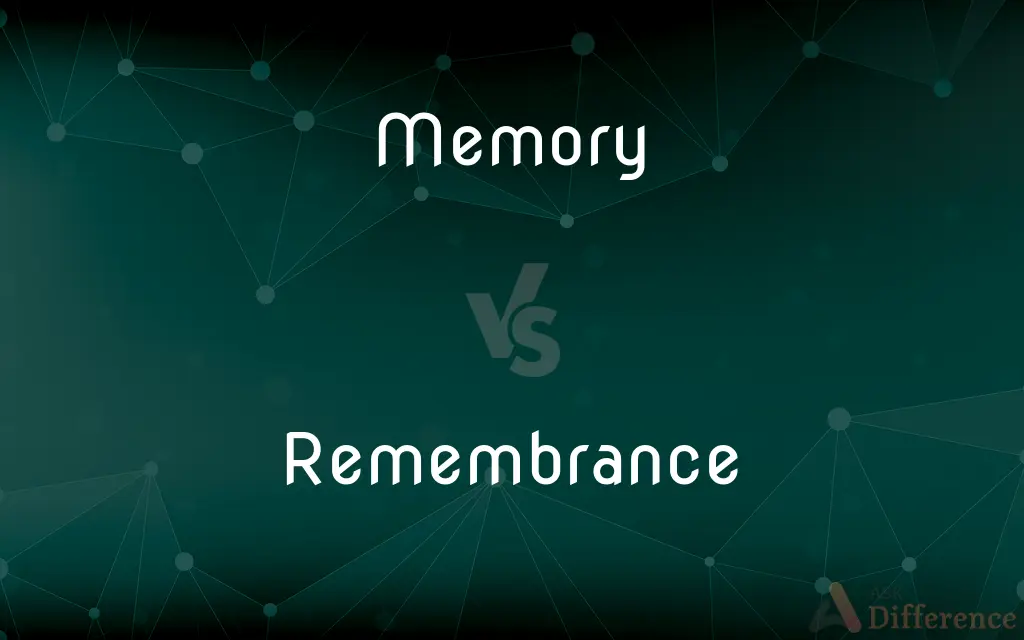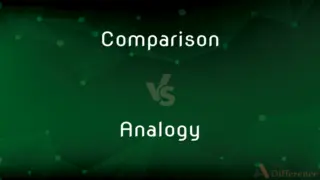Memory vs. Remembrance — What's the Difference?
By Tayyaba Rehman & Maham Liaqat — Updated on March 12, 2024
Memory encapsulates cognitive recall of past experiences, while remembrance is the deliberate act of recalling or honoring those memories.

Difference Between Memory and Remembrance
Table of Contents
ADVERTISEMENT
Key Differences
Memory involves the brain's capability to store, retain, and recall information and experiences, making it a fundamental component of cognitive function and learning. Whereas remembrance is more specific and often associated with the act of honoring or commemorating past events or individuals, usually in a formal or ceremonial context.
Memory operates on a personal and often subconscious level, allowing individuals to recall facts, events, and experiences without deliberate effort. On the other hand, remembrance typically involves a conscious decision to recall or honor past events, often shared within a community or culture, and can be expressed through rituals, ceremonies, or moments of silence.
While memory can be involuntary and spontaneous, bringing back both positive and negative experiences without any control, remembrance is a selective process, focusing on particular events or individuals deemed worthy of honor or commemoration.
Memory is crucial for learning and adaptation, as it allows individuals to build on past experiences and knowledge. Remembrance, however, plays a key role in cultural and historical identity, helping societies to remember and respect their history, traditions, and the contributions of those who came before.
Memory's accuracy can fade or become distorted over time, affected by various factors including age, emotional state, and subsequent experiences. Remembrance, in contrast, can involve a more collective or shared aspect, where societies, groups, or families maintain and pass down memories through stories, rituals, and traditions, sometimes enhancing their symbolic importance over time.
ADVERTISEMENT
Comparison Chart
Definition
The faculty by which the mind stores and recalls information.
The act of remembering and honoring past events or people.
Nature
Involuntary and spontaneous.
Deliberate and often ceremonial.
Purpose
Personal cognitive recall for learning and adaptation.
Collective honoring or commemoration.
Process
Can be both conscious and unconscious.
Always a conscious effort.
Associated with
Individual experiences and knowledge.
Cultural, historical, or familial significance.
Compare with Definitions
Memory
Cognitive Process
Memory aids in learning new information by building on what is already known.
Remembrance
Ceremonial Act
Remembrance Day ceremonies honor military veterans.
Memory
Personal
Each person's memory of an event can vary based on their perspective.
Remembrance
Collective
Communities build monuments as a form of remembrance for significant events.
Memory
Variable Accuracy
Over time, details in one's memory of an event may become less clear or change.
Remembrance
Cultural Tradition
Annual remembrance rituals strengthen cultural bonds and heritage.
Memory
Spontaneity
A familiar scent can trigger a flood of memories unexpectedly.
Remembrance
Intentional
Families hold gatherings in remembrance of a loved one.
Memory
Neurological Basis
Memory involves complex neural networks and is subject to cognitive research.
Remembrance
Preserved Significance
Through remembrance, the legacy of historical figures is kept alive.
Memory
Which returns to its original shape when heated
Memory metal
Memory plastic
Remembrance
The action of remembering something
A flash of remembrance passed between them
Memory
Memory is the faculty of the brain by which data or information is encoded, stored, and retrieved when needed. It is the retention of information over time for the purpose of influencing future action.
Remembrance
The act or process of remembering.
Memory
The mental faculty of retaining and recalling past experience.
Remembrance
The state of being remembered
Holds him in fond remembrance.
Memory
The act or an instance of remembering; recollection
Spent the afternoon lost in memory.
Remembrance
Something serving to celebrate or honor the memory of a person or event; a memorial.
Memory
All that a person can remember
It hasn't happened in my memory.
Remembrance
The length of time over which one's memory extends
Events within my remembrance.
Memory
Something that is remembered
Pleasant childhood memories.
Remembrance
Something remembered; a reminiscence.
Memory
The fact of being remembered; remembrance
Dedicated to their parents' memory.
Remembrance
A souvenir.
Memory
The period of time covered by the remembrance or recollection of a person or group of persons
Within the memory of humankind.
Remembrance
Remembrances Greetings
Please give my remembrances to your mother.
Memory
A circuit or device that stores digital data.
Remembrance
The act of remembering; a holding in mind, or bringing to mind; recollection.
Memory
Capacity for storing information
Two gigabytes of memory.
Remembrance
The state of being remembered, or held in mind; memory, recollection.
Memory
(Statistics) The set of past events affecting a given event in a stochastic process.
Remembrance
Something remembered; a person or thing kept in memory.
Memory
The capacity of a material, such as plastic or metal, to return to a previous shape after deformation.
Remembrance
That which serves to keep in or bring to mind; a memento, a memorial, a souvenir, a token; a memorandum or note of something to be remembered.
Memory
(Immunology) The ability of the immune system to respond faster and more powerfully to subsequent exposure to an antigen.
Remembrance
The power of remembering; the reach of personal knowledge; the period over which one's memory extends.
Memory
(uncountable) The ability of the brain to record information or impressions with the facility of recalling them later at will.
Memory is a facility common to all animals.
Remembrance
(obsolete) Something to be remembered; an admonition, counsel, instruction.
Memory
A record of a thing or an event stored and available for later use by the organism.
I have no memory of that event.
My wedding is one of my happiest memories.
Remembrance
To remember; to recall to mind.
Memory
(computing) The part of a computer that stores variable executable code or data (RAM) or unalterable executable code or default data (ROM).
This data passes from the CPU to the memory.
Remembrance
The act of remembering; a holding in mind, or bringing to mind; recollection.
Lest fierce remembrance wake my sudden rage.
Lest the remembrance of his grief should fail.
Memory
The time within which past events can be or are remembered.
In recent memory
In living memory
Remembrance
The state of being remembered, or held in mind; memory; recollection.
This, ever grateful, in remembrance bear.
Memory
(obsolete) A memorial.
Remembrance
Something remembered; a person or thing kept in memory.
Memory
A term of venery for a social group of elephants, normally called a herd.
Remembrance
Something to be remembered; counsel; admoni on; instruction.
Memory
The faculty of the mind by which it retains the knowledge of previous thoughts, impressions, or events.
Memory is the purveyor of reason.
Remembrance
Power of remembering; reach of personal knowledge; period over which one's memory extends.
Thee I have heard relating what was doneEre my remembrance.
Memory
The reach and positiveness with which a person can remember; the strength and trustworthiness of one's power to reach and represent or to recall the past; as, his memory was never wrong.
Remembrance
The ability to recall past occurrences
Memory
The actual and distinct retention and recognition of past ideas in the mind; remembrance; as, in memory of youth; memories of foreign lands.
Remembrance
A recognition of meritorious service
Memory
The time within which past events can be or are remembered; as, within the memory of man.
And what, before thy memory, was doneFrom the begining.
Memory
Something, or an aggregate of things, remembered; hence, character, conduct, etc., as preserved in remembrance, history, or tradition; posthumous fame; as, the war became only a memory.
The memory of the just is blessed.
That ever-living man of memory, Henry the Fifth.
The Nonconformists . . . have, as a body, always venerated her [Elizabeth's] memory.
Memory
A memorial.
These weeds are memories of those worser hours.
Memory
Something that is remembered;
Search as he would, the memory was lost
Memory
The cognitive processes whereby past experience is remembered;
He can do it from memory
He enjoyed remembering his father
Memory
The power of retaining and recalling past experience;
He had a good memory when he was younger
Memory
An electronic memory device;
A memory and the CPU form the central part of a computer to which peripherals are attached
Memory
The area of cognitive psychology that studies memory processes;
He taught a graduate course on learning and memory
Common Curiosities
Is memory always accurate?
No, memory can be influenced by various factors and may change over time.
Can remembrance affect memory?
Yes, collective remembrance can shape or reinforce individual memories, especially through shared narratives.
Are memories always personal?
While memories are personal experiences, they can be influenced by social and cultural contexts.
Can memories be forgotten?
Yes, memories can fade or be forgotten, particularly if they are not revisited or reinforced.
Why is remembrance important in culture?
Remembrance helps maintain cultural heritage, honoring history and communal values.
How do people express remembrance?
Remembrance can be expressed through ceremonies, monuments, stories, and rituals.
Can memory be improved?
Yes, various techniques and practices can enhance memory retention and recall.
How do societies preserve remembrance?
Societies preserve remembrance through historical records, monuments, and traditions.
Is remembrance only for positive events?
Remembrance can honor both positive and negative events, acknowledging their impact and lessons.
Is remembrance always formal?
While remembrance often involves formal ceremonies, it can also be expressed in personal, informal ways.
What role does memory play in identity?
Memory is key to personal identity, as it encompasses an individual's experiences and knowledge.
Can emotional experiences affect memory?
Emotional experiences can significantly impact memory, making some memories more vivid or durable.
How does memory contribute to learning?
Memory allows individuals to build on past experiences, facilitating learning and adaptation.
How does memory affect decision-making?
Memory influences decision-making by providing a reference of past outcomes and experiences.
Can remembrance change over time?
The ways in which societies remember can evolve, reflecting changes in values and perspectives.
Share Your Discovery

Previous Comparison
Worried vs. Concerned
Next Comparison
Comparison vs. AnalogyAuthor Spotlight
Written by
Tayyaba RehmanTayyaba Rehman is a distinguished writer, currently serving as a primary contributor to askdifference.com. As a researcher in semantics and etymology, Tayyaba's passion for the complexity of languages and their distinctions has found a perfect home on the platform. Tayyaba delves into the intricacies of language, distinguishing between commonly confused words and phrases, thereby providing clarity for readers worldwide.
Co-written by
Maham Liaqat















































